Entrepreneurship and Small Business: Ventures, Traits, and Impact
VerifiedAdded on 2020/12/09
|16
|5102
|499
Report
AI Summary
This report on Entrepreneurship and Small Business Management provides a comprehensive overview of various entrepreneurial ventures, including small business entrepreneurship, scalable start-ups, large company entrepreneurship, and social entrepreneurship. It details the similarities and differences between these ventures. The report further analyzes the impact of micro and small businesses on the economy, supported by relevant data and statistics, highlighting their role in job creation and innovation. Additionally, it explores the characteristic traits and skills of successful entrepreneurs, delving into aspects of the entrepreneurial personality, motivation, and mindset. Finally, the report examines how background and experience can influence entrepreneurial performance, either hindering or fostering success. The report is well-structured, covering key aspects from different venture types to the impact of small businesses on the economy, and the traits and skills needed for entrepreneurial success.

Entrepreneurship
and small business
management
and small business
management
Paraphrase This Document
Need a fresh take? Get an instant paraphrase of this document with our AI Paraphraser

Table of Contents
INTRODUCTION...........................................................................................................................3
TASK 1............................................................................................................................................3
P1 Different types of entrepreneurial ventures and manner in which they relate to typology of
entrepreneurship.....................................................................................................................3
P2 Similarities and difference between entrepreneurial ventures..........................................5
TASK 2............................................................................................................................................7
P3 Interpret relevant data and statistics to illustrate how micro and small-business impact on
the economy............................................................................................................................7
P4 Explain small business and business start ups to growth of the social economy..............8
TASK 3............................................................................................................................................9
P5 Characteristic traits and skills of successful entrepreneurs ..............................................9
P6 Aspects entrepreneurial personality................................................................................11
TASK 4..........................................................................................................................................12
P7 Different ways by which background and experience can hamper the performance of
entrepreneurship...................................................................................................................12
CONCLUSION..............................................................................................................................14
REFERENCES..............................................................................................................................15
INTRODUCTION...........................................................................................................................3
TASK 1............................................................................................................................................3
P1 Different types of entrepreneurial ventures and manner in which they relate to typology of
entrepreneurship.....................................................................................................................3
P2 Similarities and difference between entrepreneurial ventures..........................................5
TASK 2............................................................................................................................................7
P3 Interpret relevant data and statistics to illustrate how micro and small-business impact on
the economy............................................................................................................................7
P4 Explain small business and business start ups to growth of the social economy..............8
TASK 3............................................................................................................................................9
P5 Characteristic traits and skills of successful entrepreneurs ..............................................9
P6 Aspects entrepreneurial personality................................................................................11
TASK 4..........................................................................................................................................12
P7 Different ways by which background and experience can hamper the performance of
entrepreneurship...................................................................................................................12
CONCLUSION..............................................................................................................................14
REFERENCES..............................................................................................................................15
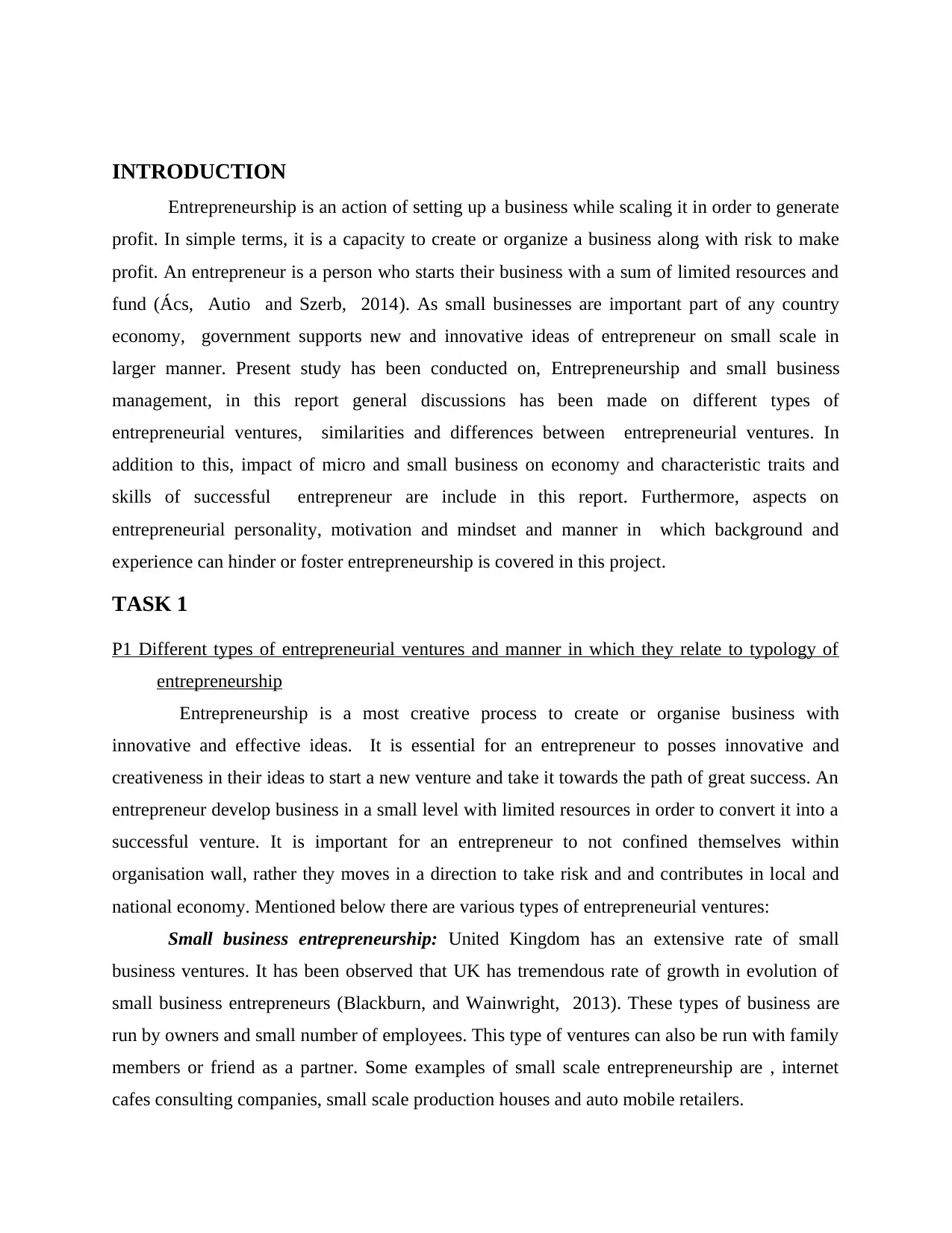
INTRODUCTION
Entrepreneurship is an action of setting up a business while scaling it in order to generate
profit. In simple terms, it is a capacity to create or organize a business along with risk to make
profit. An entrepreneur is a person who starts their business with a sum of limited resources and
fund (Ács, Autio and Szerb, 2014). As small businesses are important part of any country
economy, government supports new and innovative ideas of entrepreneur on small scale in
larger manner. Present study has been conducted on, Entrepreneurship and small business
management, in this report general discussions has been made on different types of
entrepreneurial ventures, similarities and differences between entrepreneurial ventures. In
addition to this, impact of micro and small business on economy and characteristic traits and
skills of successful entrepreneur are include in this report. Furthermore, aspects on
entrepreneurial personality, motivation and mindset and manner in which background and
experience can hinder or foster entrepreneurship is covered in this project.
TASK 1
P1 Different types of entrepreneurial ventures and manner in which they relate to typology of
entrepreneurship
Entrepreneurship is a most creative process to create or organise business with
innovative and effective ideas. It is essential for an entrepreneur to posses innovative and
creativeness in their ideas to start a new venture and take it towards the path of great success. An
entrepreneur develop business in a small level with limited resources in order to convert it into a
successful venture. It is important for an entrepreneur to not confined themselves within
organisation wall, rather they moves in a direction to take risk and and contributes in local and
national economy. Mentioned below there are various types of entrepreneurial ventures:
Small business entrepreneurship: United Kingdom has an extensive rate of small
business ventures. It has been observed that UK has tremendous rate of growth in evolution of
small business entrepreneurs (Blackburn, and Wainwright, 2013). These types of business are
run by owners and small number of employees. This type of ventures can also be run with family
members or friend as a partner. Some examples of small scale entrepreneurship are , internet
cafes consulting companies, small scale production houses and auto mobile retailers.
Entrepreneurship is an action of setting up a business while scaling it in order to generate
profit. In simple terms, it is a capacity to create or organize a business along with risk to make
profit. An entrepreneur is a person who starts their business with a sum of limited resources and
fund (Ács, Autio and Szerb, 2014). As small businesses are important part of any country
economy, government supports new and innovative ideas of entrepreneur on small scale in
larger manner. Present study has been conducted on, Entrepreneurship and small business
management, in this report general discussions has been made on different types of
entrepreneurial ventures, similarities and differences between entrepreneurial ventures. In
addition to this, impact of micro and small business on economy and characteristic traits and
skills of successful entrepreneur are include in this report. Furthermore, aspects on
entrepreneurial personality, motivation and mindset and manner in which background and
experience can hinder or foster entrepreneurship is covered in this project.
TASK 1
P1 Different types of entrepreneurial ventures and manner in which they relate to typology of
entrepreneurship
Entrepreneurship is a most creative process to create or organise business with
innovative and effective ideas. It is essential for an entrepreneur to posses innovative and
creativeness in their ideas to start a new venture and take it towards the path of great success. An
entrepreneur develop business in a small level with limited resources in order to convert it into a
successful venture. It is important for an entrepreneur to not confined themselves within
organisation wall, rather they moves in a direction to take risk and and contributes in local and
national economy. Mentioned below there are various types of entrepreneurial ventures:
Small business entrepreneurship: United Kingdom has an extensive rate of small
business ventures. It has been observed that UK has tremendous rate of growth in evolution of
small business entrepreneurs (Blackburn, and Wainwright, 2013). These types of business are
run by owners and small number of employees. This type of ventures can also be run with family
members or friend as a partner. Some examples of small scale entrepreneurship are , internet
cafes consulting companies, small scale production houses and auto mobile retailers.
⊘ This is a preview!⊘
Do you want full access?
Subscribe today to unlock all pages.

Trusted by 1+ million students worldwide
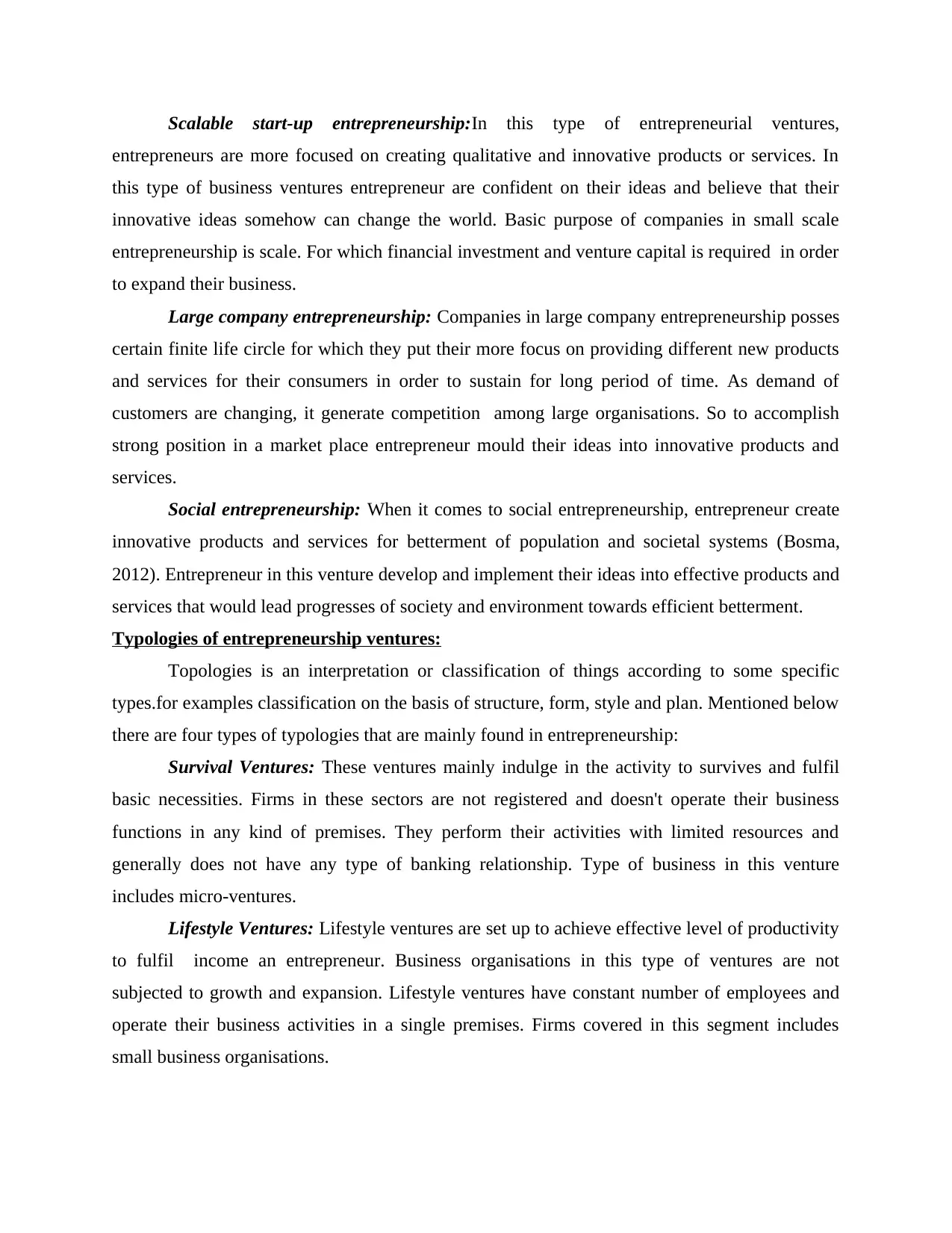
Scalable start-up entrepreneurship:In this type of entrepreneurial ventures,
entrepreneurs are more focused on creating qualitative and innovative products or services. In
this type of business ventures entrepreneur are confident on their ideas and believe that their
innovative ideas somehow can change the world. Basic purpose of companies in small scale
entrepreneurship is scale. For which financial investment and venture capital is required in order
to expand their business.
Large company entrepreneurship: Companies in large company entrepreneurship posses
certain finite life circle for which they put their more focus on providing different new products
and services for their consumers in order to sustain for long period of time. As demand of
customers are changing, it generate competition among large organisations. So to accomplish
strong position in a market place entrepreneur mould their ideas into innovative products and
services.
Social entrepreneurship: When it comes to social entrepreneurship, entrepreneur create
innovative products and services for betterment of population and societal systems (Bosma,
2012). Entrepreneur in this venture develop and implement their ideas into effective products and
services that would lead progresses of society and environment towards efficient betterment.
Typologies of entrepreneurship ventures:
Topologies is an interpretation or classification of things according to some specific
types.for examples classification on the basis of structure, form, style and plan. Mentioned below
there are four types of typologies that are mainly found in entrepreneurship:
Survival Ventures: These ventures mainly indulge in the activity to survives and fulfil
basic necessities. Firms in these sectors are not registered and doesn't operate their business
functions in any kind of premises. They perform their activities with limited resources and
generally does not have any type of banking relationship. Type of business in this venture
includes micro-ventures.
Lifestyle Ventures: Lifestyle ventures are set up to achieve effective level of productivity
to fulfil income an entrepreneur. Business organisations in this type of ventures are not
subjected to growth and expansion. Lifestyle ventures have constant number of employees and
operate their business activities in a single premises. Firms covered in this segment includes
small business organisations.
entrepreneurs are more focused on creating qualitative and innovative products or services. In
this type of business ventures entrepreneur are confident on their ideas and believe that their
innovative ideas somehow can change the world. Basic purpose of companies in small scale
entrepreneurship is scale. For which financial investment and venture capital is required in order
to expand their business.
Large company entrepreneurship: Companies in large company entrepreneurship posses
certain finite life circle for which they put their more focus on providing different new products
and services for their consumers in order to sustain for long period of time. As demand of
customers are changing, it generate competition among large organisations. So to accomplish
strong position in a market place entrepreneur mould their ideas into innovative products and
services.
Social entrepreneurship: When it comes to social entrepreneurship, entrepreneur create
innovative products and services for betterment of population and societal systems (Bosma,
2012). Entrepreneur in this venture develop and implement their ideas into effective products and
services that would lead progresses of society and environment towards efficient betterment.
Typologies of entrepreneurship ventures:
Topologies is an interpretation or classification of things according to some specific
types.for examples classification on the basis of structure, form, style and plan. Mentioned below
there are four types of typologies that are mainly found in entrepreneurship:
Survival Ventures: These ventures mainly indulge in the activity to survives and fulfil
basic necessities. Firms in these sectors are not registered and doesn't operate their business
functions in any kind of premises. They perform their activities with limited resources and
generally does not have any type of banking relationship. Type of business in this venture
includes micro-ventures.
Lifestyle Ventures: Lifestyle ventures are set up to achieve effective level of productivity
to fulfil income an entrepreneur. Business organisations in this type of ventures are not
subjected to growth and expansion. Lifestyle ventures have constant number of employees and
operate their business activities in a single premises. Firms covered in this segment includes
small business organisations.
Paraphrase This Document
Need a fresh take? Get an instant paraphrase of this document with our AI Paraphraser
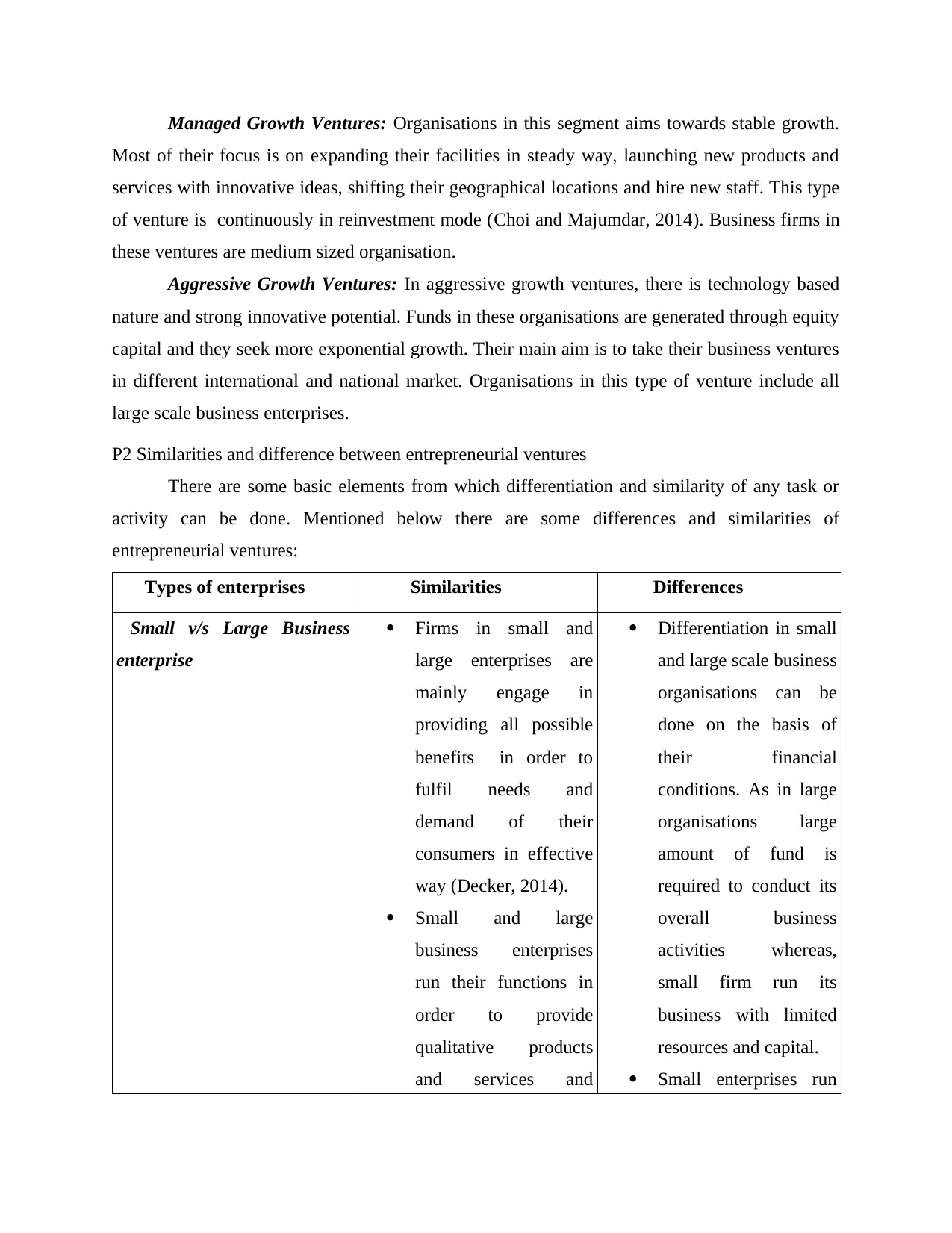
Managed Growth Ventures: Organisations in this segment aims towards stable growth.
Most of their focus is on expanding their facilities in steady way, launching new products and
services with innovative ideas, shifting their geographical locations and hire new staff. This type
of venture is continuously in reinvestment mode (Choi and Majumdar, 2014). Business firms in
these ventures are medium sized organisation.
Aggressive Growth Ventures: In aggressive growth ventures, there is technology based
nature and strong innovative potential. Funds in these organisations are generated through equity
capital and they seek more exponential growth. Their main aim is to take their business ventures
in different international and national market. Organisations in this type of venture include all
large scale business enterprises.
P2 Similarities and difference between entrepreneurial ventures
There are some basic elements from which differentiation and similarity of any task or
activity can be done. Mentioned below there are some differences and similarities of
entrepreneurial ventures:
Types of enterprises Similarities Differences
Small v/s Large Business
enterprise
Firms in small and
large enterprises are
mainly engage in
providing all possible
benefits in order to
fulfil needs and
demand of their
consumers in effective
way (Decker, 2014).
Small and large
business enterprises
run their functions in
order to provide
qualitative products
and services and
Differentiation in small
and large scale business
organisations can be
done on the basis of
their financial
conditions. As in large
organisations large
amount of fund is
required to conduct its
overall business
activities whereas,
small firm run its
business with limited
resources and capital.
Small enterprises run
Most of their focus is on expanding their facilities in steady way, launching new products and
services with innovative ideas, shifting their geographical locations and hire new staff. This type
of venture is continuously in reinvestment mode (Choi and Majumdar, 2014). Business firms in
these ventures are medium sized organisation.
Aggressive Growth Ventures: In aggressive growth ventures, there is technology based
nature and strong innovative potential. Funds in these organisations are generated through equity
capital and they seek more exponential growth. Their main aim is to take their business ventures
in different international and national market. Organisations in this type of venture include all
large scale business enterprises.
P2 Similarities and difference between entrepreneurial ventures
There are some basic elements from which differentiation and similarity of any task or
activity can be done. Mentioned below there are some differences and similarities of
entrepreneurial ventures:
Types of enterprises Similarities Differences
Small v/s Large Business
enterprise
Firms in small and
large enterprises are
mainly engage in
providing all possible
benefits in order to
fulfil needs and
demand of their
consumers in effective
way (Decker, 2014).
Small and large
business enterprises
run their functions in
order to provide
qualitative products
and services and
Differentiation in small
and large scale business
organisations can be
done on the basis of
their financial
conditions. As in large
organisations large
amount of fund is
required to conduct its
overall business
activities whereas,
small firm run its
business with limited
resources and capital.
Small enterprises run
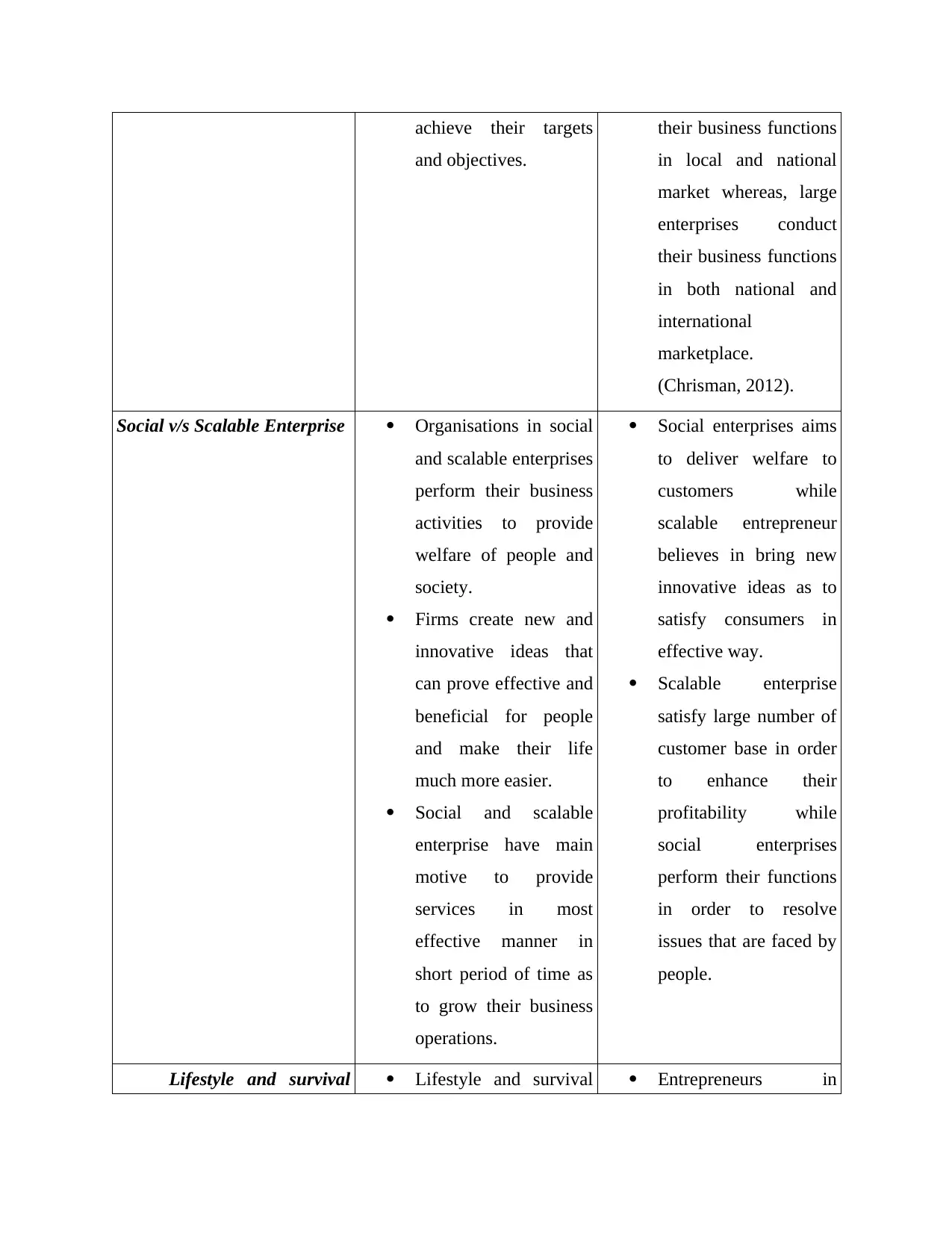
achieve their targets
and objectives.
their business functions
in local and national
market whereas, large
enterprises conduct
their business functions
in both national and
international
marketplace.
(Chrisman, 2012).
Social v/s Scalable Enterprise Organisations in social
and scalable enterprises
perform their business
activities to provide
welfare of people and
society.
Firms create new and
innovative ideas that
can prove effective and
beneficial for people
and make their life
much more easier.
Social and scalable
enterprise have main
motive to provide
services in most
effective manner in
short period of time as
to grow their business
operations.
Social enterprises aims
to deliver welfare to
customers while
scalable entrepreneur
believes in bring new
innovative ideas as to
satisfy consumers in
effective way.
Scalable enterprise
satisfy large number of
customer base in order
to enhance their
profitability while
social enterprises
perform their functions
in order to resolve
issues that are faced by
people.
Lifestyle and survival Lifestyle and survival Entrepreneurs in
and objectives.
their business functions
in local and national
market whereas, large
enterprises conduct
their business functions
in both national and
international
marketplace.
(Chrisman, 2012).
Social v/s Scalable Enterprise Organisations in social
and scalable enterprises
perform their business
activities to provide
welfare of people and
society.
Firms create new and
innovative ideas that
can prove effective and
beneficial for people
and make their life
much more easier.
Social and scalable
enterprise have main
motive to provide
services in most
effective manner in
short period of time as
to grow their business
operations.
Social enterprises aims
to deliver welfare to
customers while
scalable entrepreneur
believes in bring new
innovative ideas as to
satisfy consumers in
effective way.
Scalable enterprise
satisfy large number of
customer base in order
to enhance their
profitability while
social enterprises
perform their functions
in order to resolve
issues that are faced by
people.
Lifestyle and survival Lifestyle and survival Entrepreneurs in
⊘ This is a preview!⊘
Do you want full access?
Subscribe today to unlock all pages.

Trusted by 1+ million students worldwide
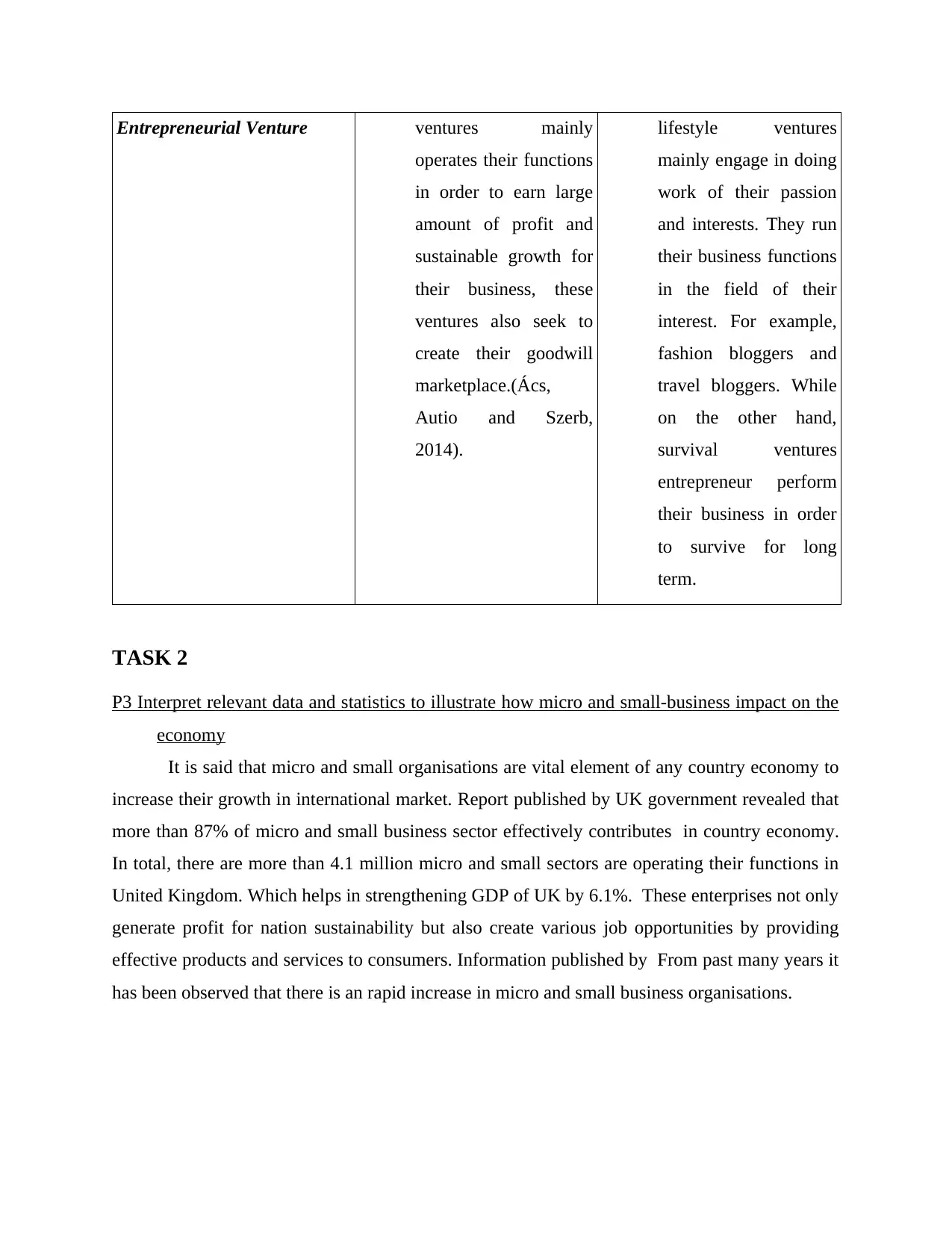
Entrepreneurial Venture ventures mainly
operates their functions
in order to earn large
amount of profit and
sustainable growth for
their business, these
ventures also seek to
create their goodwill
marketplace.(Ács,
Autio and Szerb,
2014).
lifestyle ventures
mainly engage in doing
work of their passion
and interests. They run
their business functions
in the field of their
interest. For example,
fashion bloggers and
travel bloggers. While
on the other hand,
survival ventures
entrepreneur perform
their business in order
to survive for long
term.
TASK 2
P3 Interpret relevant data and statistics to illustrate how micro and small-business impact on the
economy
It is said that micro and small organisations are vital element of any country economy to
increase their growth in international market. Report published by UK government revealed that
more than 87% of micro and small business sector effectively contributes in country economy.
In total, there are more than 4.1 million micro and small sectors are operating their functions in
United Kingdom. Which helps in strengthening GDP of UK by 6.1%. These enterprises not only
generate profit for nation sustainability but also create various job opportunities by providing
effective products and services to consumers. Information published by From past many years it
has been observed that there is an rapid increase in micro and small business organisations.
operates their functions
in order to earn large
amount of profit and
sustainable growth for
their business, these
ventures also seek to
create their goodwill
marketplace.(Ács,
Autio and Szerb,
2014).
lifestyle ventures
mainly engage in doing
work of their passion
and interests. They run
their business functions
in the field of their
interest. For example,
fashion bloggers and
travel bloggers. While
on the other hand,
survival ventures
entrepreneur perform
their business in order
to survive for long
term.
TASK 2
P3 Interpret relevant data and statistics to illustrate how micro and small-business impact on the
economy
It is said that micro and small organisations are vital element of any country economy to
increase their growth in international market. Report published by UK government revealed that
more than 87% of micro and small business sector effectively contributes in country economy.
In total, there are more than 4.1 million micro and small sectors are operating their functions in
United Kingdom. Which helps in strengthening GDP of UK by 6.1%. These enterprises not only
generate profit for nation sustainability but also create various job opportunities by providing
effective products and services to consumers. Information published by From past many years it
has been observed that there is an rapid increase in micro and small business organisations.
Paraphrase This Document
Need a fresh take? Get an instant paraphrase of this document with our AI Paraphraser
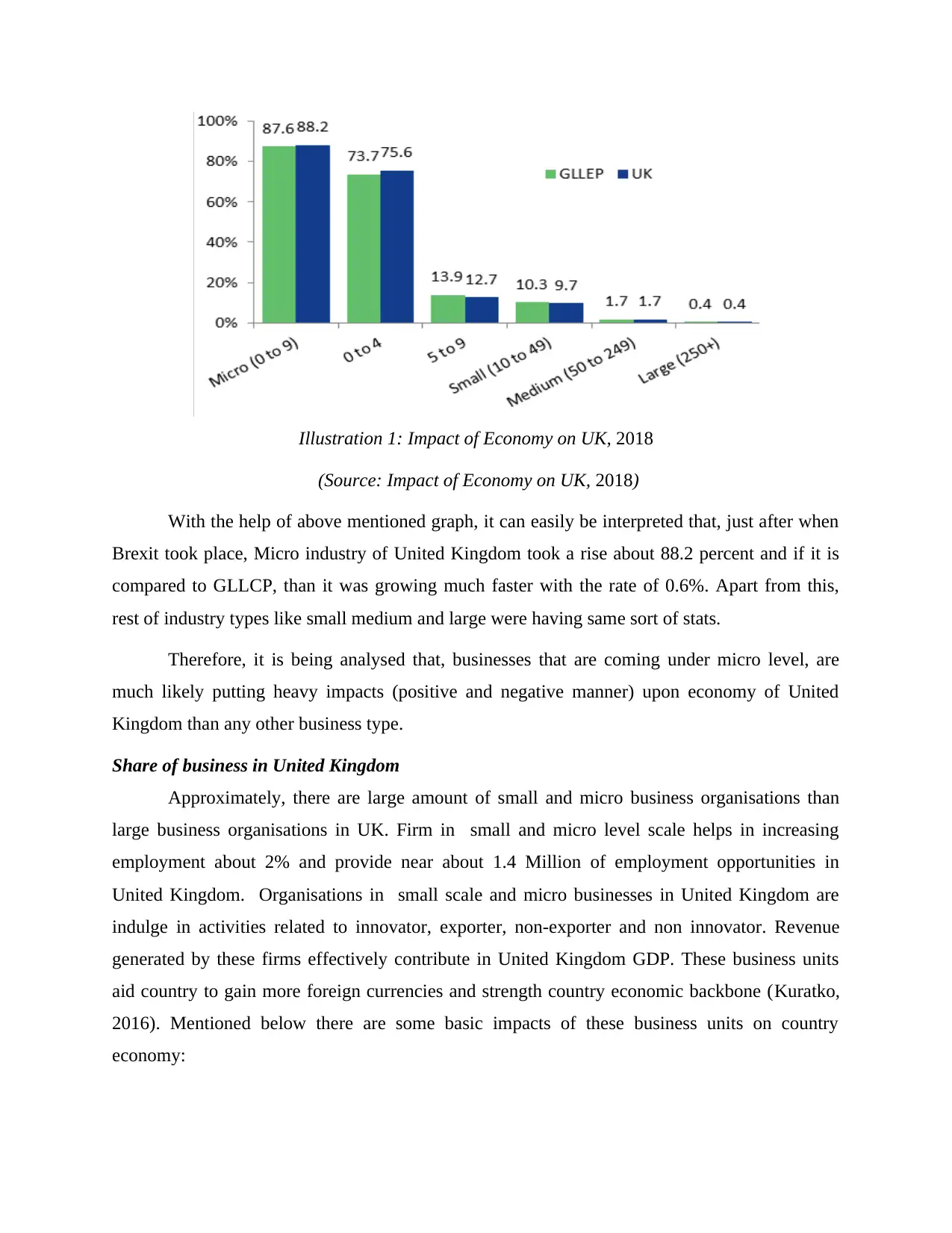
Illustration 1: Impact of Economy on UK, 2018
(Source: Impact of Economy on UK, 2018)
With the help of above mentioned graph, it can easily be interpreted that, just after when
Brexit took place, Micro industry of United Kingdom took a rise about 88.2 percent and if it is
compared to GLLCP, than it was growing much faster with the rate of 0.6%. Apart from this,
rest of industry types like small medium and large were having same sort of stats.
Therefore, it is being analysed that, businesses that are coming under micro level, are
much likely putting heavy impacts (positive and negative manner) upon economy of United
Kingdom than any other business type.
Share of business in United Kingdom
Approximately, there are large amount of small and micro business organisations than
large business organisations in UK. Firm in small and micro level scale helps in increasing
employment about 2% and provide near about 1.4 Million of employment opportunities in
United Kingdom. Organisations in small scale and micro businesses in United Kingdom are
indulge in activities related to innovator, exporter, non-exporter and non innovator. Revenue
generated by these firms effectively contribute in United Kingdom GDP. These business units
aid country to gain more foreign currencies and strength country economic backbone (Kuratko,
2016). Mentioned below there are some basic impacts of these business units on country
economy:
(Source: Impact of Economy on UK, 2018)
With the help of above mentioned graph, it can easily be interpreted that, just after when
Brexit took place, Micro industry of United Kingdom took a rise about 88.2 percent and if it is
compared to GLLCP, than it was growing much faster with the rate of 0.6%. Apart from this,
rest of industry types like small medium and large were having same sort of stats.
Therefore, it is being analysed that, businesses that are coming under micro level, are
much likely putting heavy impacts (positive and negative manner) upon economy of United
Kingdom than any other business type.
Share of business in United Kingdom
Approximately, there are large amount of small and micro business organisations than
large business organisations in UK. Firm in small and micro level scale helps in increasing
employment about 2% and provide near about 1.4 Million of employment opportunities in
United Kingdom. Organisations in small scale and micro businesses in United Kingdom are
indulge in activities related to innovator, exporter, non-exporter and non innovator. Revenue
generated by these firms effectively contribute in United Kingdom GDP. These business units
aid country to gain more foreign currencies and strength country economic backbone (Kuratko,
2016). Mentioned below there are some basic impacts of these business units on country
economy:
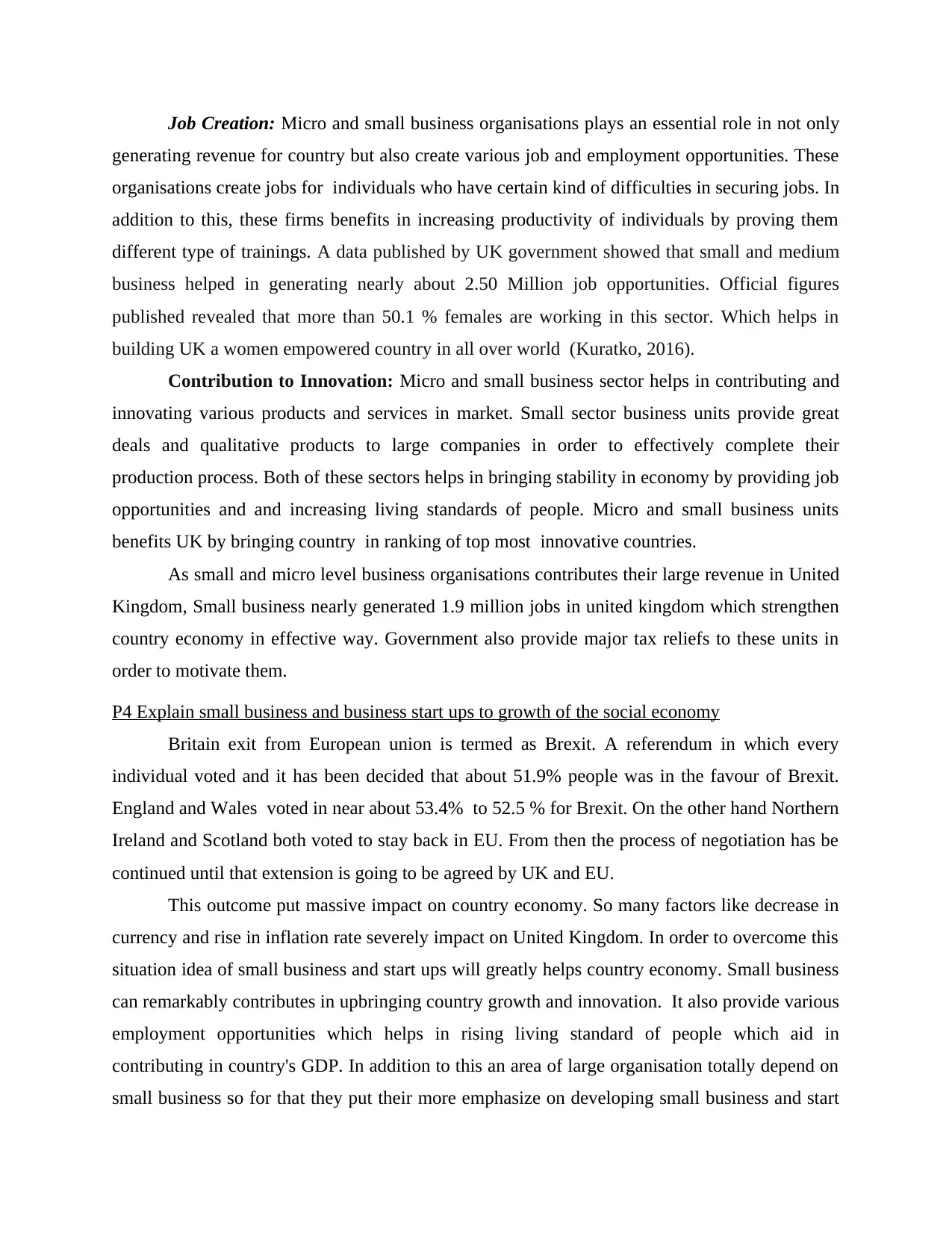
Job Creation: Micro and small business organisations plays an essential role in not only
generating revenue for country but also create various job and employment opportunities. These
organisations create jobs for individuals who have certain kind of difficulties in securing jobs. In
addition to this, these firms benefits in increasing productivity of individuals by proving them
different type of trainings. A data published by UK government showed that small and medium
business helped in generating nearly about 2.50 Million job opportunities. Official figures
published revealed that more than 50.1 % females are working in this sector. Which helps in
building UK a women empowered country in all over world (Kuratko, 2016).
Contribution to Innovation: Micro and small business sector helps in contributing and
innovating various products and services in market. Small sector business units provide great
deals and qualitative products to large companies in order to effectively complete their
production process. Both of these sectors helps in bringing stability in economy by providing job
opportunities and and increasing living standards of people. Micro and small business units
benefits UK by bringing country in ranking of top most innovative countries.
As small and micro level business organisations contributes their large revenue in United
Kingdom, Small business nearly generated 1.9 million jobs in united kingdom which strengthen
country economy in effective way. Government also provide major tax reliefs to these units in
order to motivate them.
P4 Explain small business and business start ups to growth of the social economy
Britain exit from European union is termed as Brexit. A referendum in which every
individual voted and it has been decided that about 51.9% people was in the favour of Brexit.
England and Wales voted in near about 53.4% to 52.5 % for Brexit. On the other hand Northern
Ireland and Scotland both voted to stay back in EU. From then the process of negotiation has be
continued until that extension is going to be agreed by UK and EU.
This outcome put massive impact on country economy. So many factors like decrease in
currency and rise in inflation rate severely impact on United Kingdom. In order to overcome this
situation idea of small business and start ups will greatly helps country economy. Small business
can remarkably contributes in upbringing country growth and innovation. It also provide various
employment opportunities which helps in rising living standard of people which aid in
contributing in country's GDP. In addition to this an area of large organisation totally depend on
small business so for that they put their more emphasize on developing small business and start
generating revenue for country but also create various job and employment opportunities. These
organisations create jobs for individuals who have certain kind of difficulties in securing jobs. In
addition to this, these firms benefits in increasing productivity of individuals by proving them
different type of trainings. A data published by UK government showed that small and medium
business helped in generating nearly about 2.50 Million job opportunities. Official figures
published revealed that more than 50.1 % females are working in this sector. Which helps in
building UK a women empowered country in all over world (Kuratko, 2016).
Contribution to Innovation: Micro and small business sector helps in contributing and
innovating various products and services in market. Small sector business units provide great
deals and qualitative products to large companies in order to effectively complete their
production process. Both of these sectors helps in bringing stability in economy by providing job
opportunities and and increasing living standards of people. Micro and small business units
benefits UK by bringing country in ranking of top most innovative countries.
As small and micro level business organisations contributes their large revenue in United
Kingdom, Small business nearly generated 1.9 million jobs in united kingdom which strengthen
country economy in effective way. Government also provide major tax reliefs to these units in
order to motivate them.
P4 Explain small business and business start ups to growth of the social economy
Britain exit from European union is termed as Brexit. A referendum in which every
individual voted and it has been decided that about 51.9% people was in the favour of Brexit.
England and Wales voted in near about 53.4% to 52.5 % for Brexit. On the other hand Northern
Ireland and Scotland both voted to stay back in EU. From then the process of negotiation has be
continued until that extension is going to be agreed by UK and EU.
This outcome put massive impact on country economy. So many factors like decrease in
currency and rise in inflation rate severely impact on United Kingdom. In order to overcome this
situation idea of small business and start ups will greatly helps country economy. Small business
can remarkably contributes in upbringing country growth and innovation. It also provide various
employment opportunities which helps in rising living standard of people which aid in
contributing in country's GDP. In addition to this an area of large organisation totally depend on
small business so for that they put their more emphasize on developing small business and start
⊘ This is a preview!⊘
Do you want full access?
Subscribe today to unlock all pages.

Trusted by 1+ million students worldwide
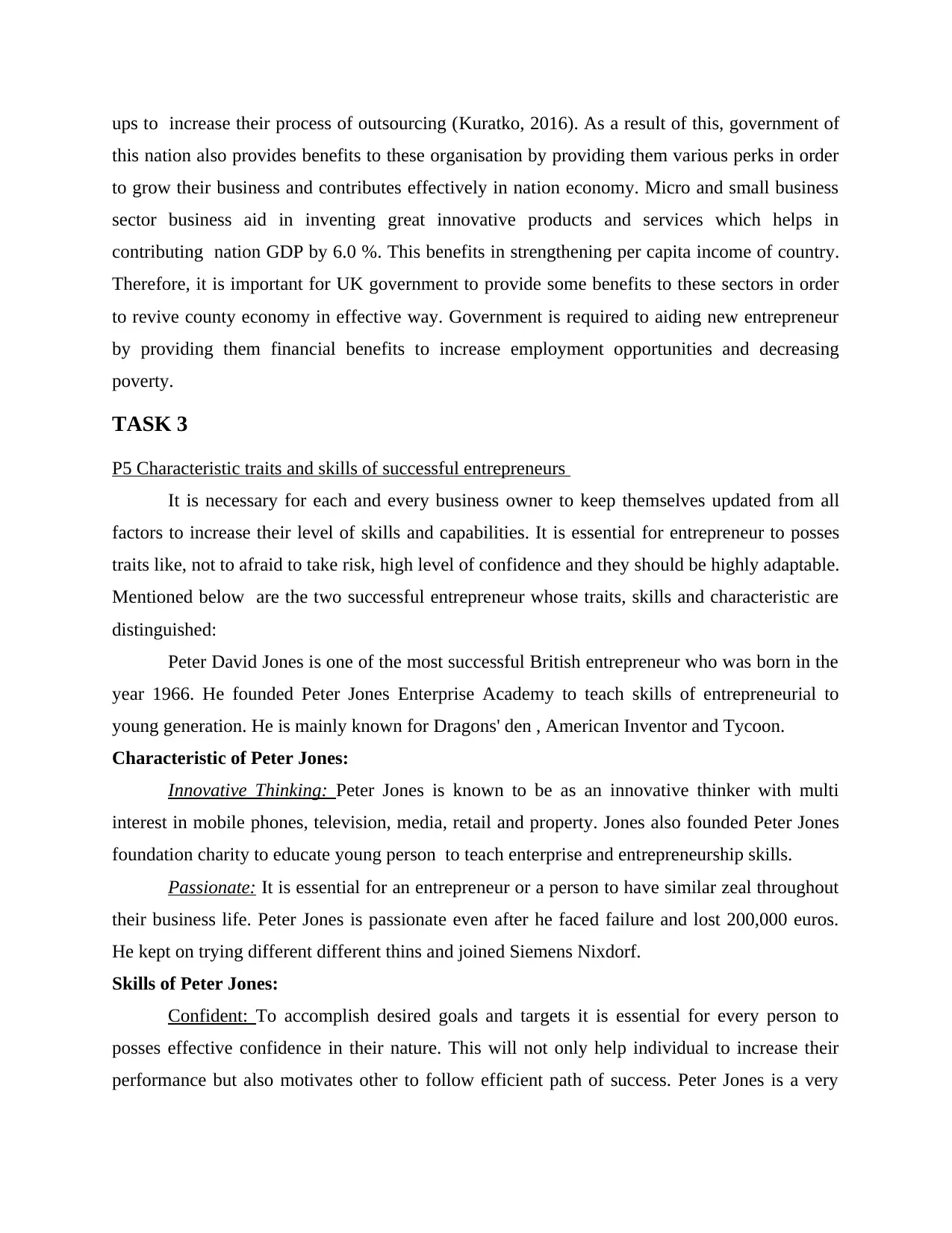
ups to increase their process of outsourcing (Kuratko, 2016). As a result of this, government of
this nation also provides benefits to these organisation by providing them various perks in order
to grow their business and contributes effectively in nation economy. Micro and small business
sector business aid in inventing great innovative products and services which helps in
contributing nation GDP by 6.0 %. This benefits in strengthening per capita income of country.
Therefore, it is important for UK government to provide some benefits to these sectors in order
to revive county economy in effective way. Government is required to aiding new entrepreneur
by providing them financial benefits to increase employment opportunities and decreasing
poverty.
TASK 3
P5 Characteristic traits and skills of successful entrepreneurs
It is necessary for each and every business owner to keep themselves updated from all
factors to increase their level of skills and capabilities. It is essential for entrepreneur to posses
traits like, not to afraid to take risk, high level of confidence and they should be highly adaptable.
Mentioned below are the two successful entrepreneur whose traits, skills and characteristic are
distinguished:
Peter David Jones is one of the most successful British entrepreneur who was born in the
year 1966. He founded Peter Jones Enterprise Academy to teach skills of entrepreneurial to
young generation. He is mainly known for Dragons' den , American Inventor and Tycoon.
Characteristic of Peter Jones:
Innovative Thinking: Peter Jones is known to be as an innovative thinker with multi
interest in mobile phones, television, media, retail and property. Jones also founded Peter Jones
foundation charity to educate young person to teach enterprise and entrepreneurship skills.
Passionate: It is essential for an entrepreneur or a person to have similar zeal throughout
their business life. Peter Jones is passionate even after he faced failure and lost 200,000 euros.
He kept on trying different different thins and joined Siemens Nixdorf.
Skills of Peter Jones:
Confident: To accomplish desired goals and targets it is essential for every person to
posses effective confidence in their nature. This will not only help individual to increase their
performance but also motivates other to follow efficient path of success. Peter Jones is a very
this nation also provides benefits to these organisation by providing them various perks in order
to grow their business and contributes effectively in nation economy. Micro and small business
sector business aid in inventing great innovative products and services which helps in
contributing nation GDP by 6.0 %. This benefits in strengthening per capita income of country.
Therefore, it is important for UK government to provide some benefits to these sectors in order
to revive county economy in effective way. Government is required to aiding new entrepreneur
by providing them financial benefits to increase employment opportunities and decreasing
poverty.
TASK 3
P5 Characteristic traits and skills of successful entrepreneurs
It is necessary for each and every business owner to keep themselves updated from all
factors to increase their level of skills and capabilities. It is essential for entrepreneur to posses
traits like, not to afraid to take risk, high level of confidence and they should be highly adaptable.
Mentioned below are the two successful entrepreneur whose traits, skills and characteristic are
distinguished:
Peter David Jones is one of the most successful British entrepreneur who was born in the
year 1966. He founded Peter Jones Enterprise Academy to teach skills of entrepreneurial to
young generation. He is mainly known for Dragons' den , American Inventor and Tycoon.
Characteristic of Peter Jones:
Innovative Thinking: Peter Jones is known to be as an innovative thinker with multi
interest in mobile phones, television, media, retail and property. Jones also founded Peter Jones
foundation charity to educate young person to teach enterprise and entrepreneurship skills.
Passionate: It is essential for an entrepreneur or a person to have similar zeal throughout
their business life. Peter Jones is passionate even after he faced failure and lost 200,000 euros.
He kept on trying different different thins and joined Siemens Nixdorf.
Skills of Peter Jones:
Confident: To accomplish desired goals and targets it is essential for every person to
posses effective confidence in their nature. This will not only help individual to increase their
performance but also motivates other to follow efficient path of success. Peter Jones is a very
Paraphrase This Document
Need a fresh take? Get an instant paraphrase of this document with our AI Paraphraser
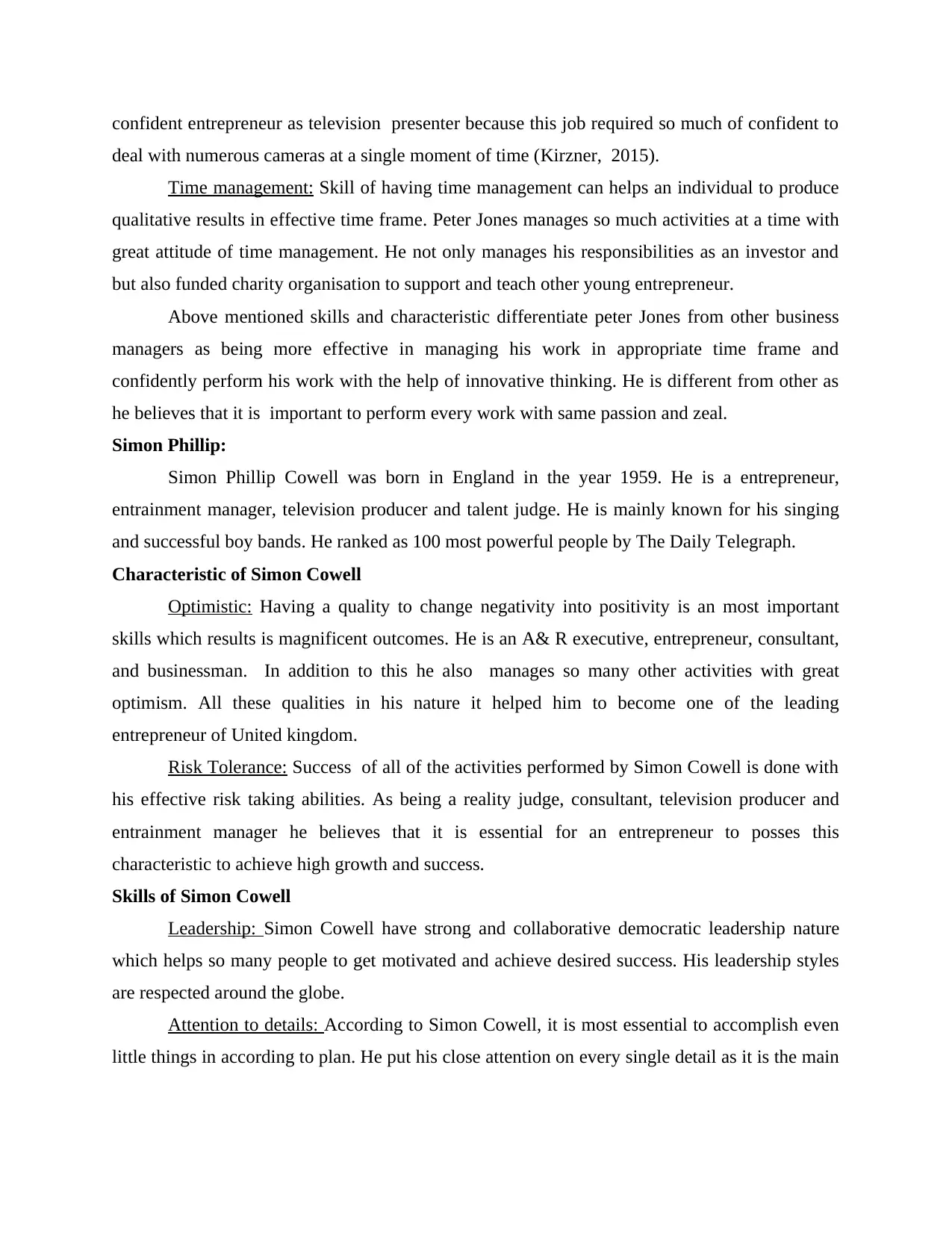
confident entrepreneur as television presenter because this job required so much of confident to
deal with numerous cameras at a single moment of time (Kirzner, 2015).
Time management: Skill of having time management can helps an individual to produce
qualitative results in effective time frame. Peter Jones manages so much activities at a time with
great attitude of time management. He not only manages his responsibilities as an investor and
but also funded charity organisation to support and teach other young entrepreneur.
Above mentioned skills and characteristic differentiate peter Jones from other business
managers as being more effective in managing his work in appropriate time frame and
confidently perform his work with the help of innovative thinking. He is different from other as
he believes that it is important to perform every work with same passion and zeal.
Simon Phillip:
Simon Phillip Cowell was born in England in the year 1959. He is a entrepreneur,
entrainment manager, television producer and talent judge. He is mainly known for his singing
and successful boy bands. He ranked as 100 most powerful people by The Daily Telegraph.
Characteristic of Simon Cowell
Optimistic: Having a quality to change negativity into positivity is an most important
skills which results is magnificent outcomes. He is an A& R executive, entrepreneur, consultant,
and businessman. In addition to this he also manages so many other activities with great
optimism. All these qualities in his nature it helped him to become one of the leading
entrepreneur of United kingdom.
Risk Tolerance: Success of all of the activities performed by Simon Cowell is done with
his effective risk taking abilities. As being a reality judge, consultant, television producer and
entrainment manager he believes that it is essential for an entrepreneur to posses this
characteristic to achieve high growth and success.
Skills of Simon Cowell
Leadership: Simon Cowell have strong and collaborative democratic leadership nature
which helps so many people to get motivated and achieve desired success. His leadership styles
are respected around the globe.
Attention to details: According to Simon Cowell, it is most essential to accomplish even
little things in according to plan. He put his close attention on every single detail as it is the main
deal with numerous cameras at a single moment of time (Kirzner, 2015).
Time management: Skill of having time management can helps an individual to produce
qualitative results in effective time frame. Peter Jones manages so much activities at a time with
great attitude of time management. He not only manages his responsibilities as an investor and
but also funded charity organisation to support and teach other young entrepreneur.
Above mentioned skills and characteristic differentiate peter Jones from other business
managers as being more effective in managing his work in appropriate time frame and
confidently perform his work with the help of innovative thinking. He is different from other as
he believes that it is important to perform every work with same passion and zeal.
Simon Phillip:
Simon Phillip Cowell was born in England in the year 1959. He is a entrepreneur,
entrainment manager, television producer and talent judge. He is mainly known for his singing
and successful boy bands. He ranked as 100 most powerful people by The Daily Telegraph.
Characteristic of Simon Cowell
Optimistic: Having a quality to change negativity into positivity is an most important
skills which results is magnificent outcomes. He is an A& R executive, entrepreneur, consultant,
and businessman. In addition to this he also manages so many other activities with great
optimism. All these qualities in his nature it helped him to become one of the leading
entrepreneur of United kingdom.
Risk Tolerance: Success of all of the activities performed by Simon Cowell is done with
his effective risk taking abilities. As being a reality judge, consultant, television producer and
entrainment manager he believes that it is essential for an entrepreneur to posses this
characteristic to achieve high growth and success.
Skills of Simon Cowell
Leadership: Simon Cowell have strong and collaborative democratic leadership nature
which helps so many people to get motivated and achieve desired success. His leadership styles
are respected around the globe.
Attention to details: According to Simon Cowell, it is most essential to accomplish even
little things in according to plan. He put his close attention on every single detail as it is the main
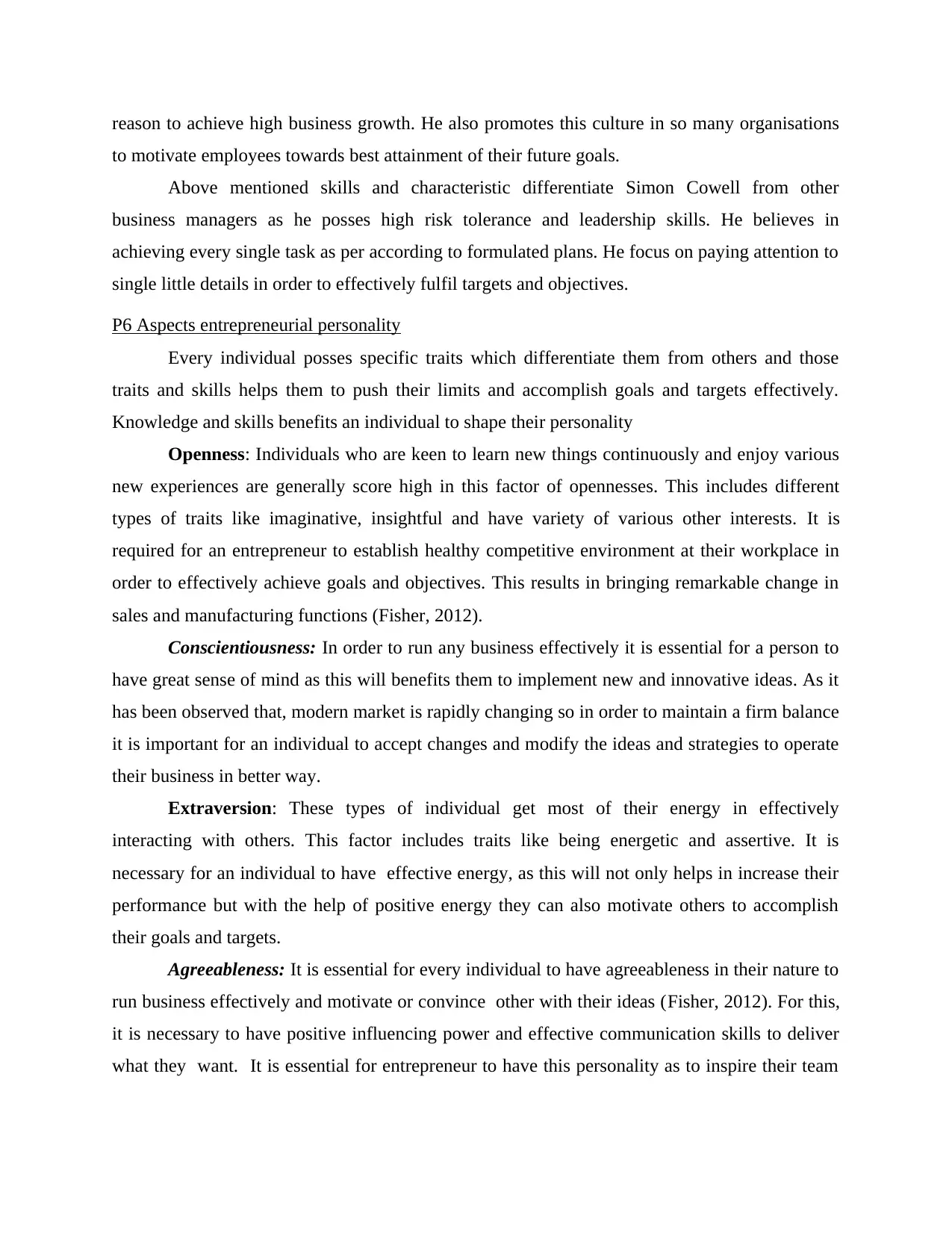
reason to achieve high business growth. He also promotes this culture in so many organisations
to motivate employees towards best attainment of their future goals.
Above mentioned skills and characteristic differentiate Simon Cowell from other
business managers as he posses high risk tolerance and leadership skills. He believes in
achieving every single task as per according to formulated plans. He focus on paying attention to
single little details in order to effectively fulfil targets and objectives.
P6 Aspects entrepreneurial personality
Every individual posses specific traits which differentiate them from others and those
traits and skills helps them to push their limits and accomplish goals and targets effectively.
Knowledge and skills benefits an individual to shape their personality
Openness: Individuals who are keen to learn new things continuously and enjoy various
new experiences are generally score high in this factor of opennesses. This includes different
types of traits like imaginative, insightful and have variety of various other interests. It is
required for an entrepreneur to establish healthy competitive environment at their workplace in
order to effectively achieve goals and objectives. This results in bringing remarkable change in
sales and manufacturing functions (Fisher, 2012).
Conscientiousness: In order to run any business effectively it is essential for a person to
have great sense of mind as this will benefits them to implement new and innovative ideas. As it
has been observed that, modern market is rapidly changing so in order to maintain a firm balance
it is important for an individual to accept changes and modify the ideas and strategies to operate
their business in better way.
Extraversion: These types of individual get most of their energy in effectively
interacting with others. This factor includes traits like being energetic and assertive. It is
necessary for an individual to have effective energy, as this will not only helps in increase their
performance but with the help of positive energy they can also motivate others to accomplish
their goals and targets.
Agreeableness: It is essential for every individual to have agreeableness in their nature to
run business effectively and motivate or convince other with their ideas (Fisher, 2012). For this,
it is necessary to have positive influencing power and effective communication skills to deliver
what they want. It is essential for entrepreneur to have this personality as to inspire their team
to motivate employees towards best attainment of their future goals.
Above mentioned skills and characteristic differentiate Simon Cowell from other
business managers as he posses high risk tolerance and leadership skills. He believes in
achieving every single task as per according to formulated plans. He focus on paying attention to
single little details in order to effectively fulfil targets and objectives.
P6 Aspects entrepreneurial personality
Every individual posses specific traits which differentiate them from others and those
traits and skills helps them to push their limits and accomplish goals and targets effectively.
Knowledge and skills benefits an individual to shape their personality
Openness: Individuals who are keen to learn new things continuously and enjoy various
new experiences are generally score high in this factor of opennesses. This includes different
types of traits like imaginative, insightful and have variety of various other interests. It is
required for an entrepreneur to establish healthy competitive environment at their workplace in
order to effectively achieve goals and objectives. This results in bringing remarkable change in
sales and manufacturing functions (Fisher, 2012).
Conscientiousness: In order to run any business effectively it is essential for a person to
have great sense of mind as this will benefits them to implement new and innovative ideas. As it
has been observed that, modern market is rapidly changing so in order to maintain a firm balance
it is important for an individual to accept changes and modify the ideas and strategies to operate
their business in better way.
Extraversion: These types of individual get most of their energy in effectively
interacting with others. This factor includes traits like being energetic and assertive. It is
necessary for an individual to have effective energy, as this will not only helps in increase their
performance but with the help of positive energy they can also motivate others to accomplish
their goals and targets.
Agreeableness: It is essential for every individual to have agreeableness in their nature to
run business effectively and motivate or convince other with their ideas (Fisher, 2012). For this,
it is necessary to have positive influencing power and effective communication skills to deliver
what they want. It is essential for entrepreneur to have this personality as to inspire their team
⊘ This is a preview!⊘
Do you want full access?
Subscribe today to unlock all pages.

Trusted by 1+ million students worldwide
1 out of 16
Related Documents
Your All-in-One AI-Powered Toolkit for Academic Success.
+13062052269
info@desklib.com
Available 24*7 on WhatsApp / Email
![[object Object]](/_next/static/media/star-bottom.7253800d.svg)
Unlock your academic potential
Copyright © 2020–2025 A2Z Services. All Rights Reserved. Developed and managed by ZUCOL.





